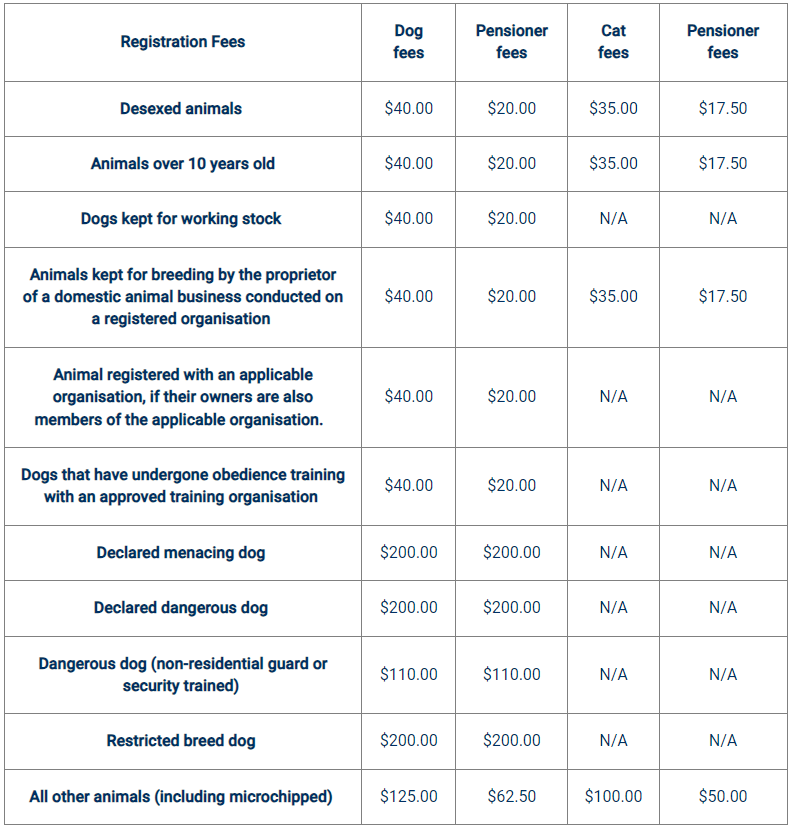Pet Registrations
Pet registration and microchipping is a legal requirement under the Domestic Animals Act 1994 for every dog and cat over three months of age.
Registration enables Council to provide facilities such as dog parks, pounds and shelters and reunite lost pets with their owners.
Dogs and cats over three months of age must be registered with Council. Microchipping and registering pets greatly improves their chances of being returned to you if they become lost. All registrations are due for renewal on the 10 April each year regardless of what date they were registered. To assist with identification, cats and dogs must wear their registration tag at all times and must be microchipped.
If being registered for the first time, dogs and cats must be microchipped before registration. Registration fees are set by Council, and vary depending on a number of factors. Contact Council to find out which fees apply to your pet, or see the table below for reference.
You are eligible for reduced registration fees if your pet is:
- de-sexed
- has an obedience certificate issued by a Government approved organisation
- over 10 years of age
- kept for working stock
- kept for breeding by the proprietor of a registered domestic animal business
Pensioners who have approved concession cards issued by the Department of Social Services and Department of Veterans Affairs are also entitled to a reduction in their fees.
Upon registration of a new animal, microchip and desexing certificates must be produced for verification.
If the owner is under 18 years of age, a parent or guardian must sign on their behalf and is responsible for the dog or cat.
Pensioners – to receive the pension concession you must hold a pension concession card which entitles you to a rebate on rates. Health card holders are not entitled to a rebate. The pensioner concession does not apply to the State Government levy.
Pay your pet registration renewal online
If you have received a pet registration renewal notice via post or email, you are able to pay this online via our secure portal here.
For your dog to be defined as 'working stock', you must be engaged in primary production as your primary source of income. Your dog must herd, drove, protect, tend or work stock on land used solely or primarily for primary production.
(a) means a dog usually kept or proposed to be kept
(i) on rural land; and
(ii) by an owner who is a primary producer, or a person engaged or employed by a primary producer; and
(iii) primarily for the purpose of
(b) droving, protecting, tending, or working, stock; or
(c) being trained in droving, protecting, tending, or working, stock; and
(d) does not include a class of dog prescribed under a regulation.
There are many reasons why de-sexing your pet is a responsible choice for pet owners.
Population Control
- Each year animal care organisations euthanise thousands of unwanted pets.
- De-sexing your pet will avoid the problems of unwanted puppies and kittens.
Positive behavioural changes
- In males: Are less likely to roam, 90% stop entirely. Are less likely to urinate in undesirable places, 50% stop. Castration reduces the sexual drive and ability in most dogs. 60% stop mounting people. Display less dominant behaviour. Are less aggressive towards other male dogs. 60% stop fighting. Are less aggressive towards people, reducing the risk of attacks.
- In females: Prevents oestrous behaviour (on heat). Male dogs will not be attracted and will not be a nuisance.
Medical Benefits De-sexing your pet has also shown longer term medical benefits.
- In males: Are unlikely to develop common prostate diseases which can be fatal. Approximately 60% of dogs that are not desexed develop prostatic disease.
- In females: Will not develop serious uterine infections which are common in older female dogs that are not desexed.
- Desexing before the first season greatly reduces the risk of female dogs developing breast cancer which is fatal in 50% of cases.
- Males and Females: Greatly reduces the incidence of fighting in cats and associated infections and injuries such as feline AIDS, which is spread by biting. Desexed dogs and cats are less likely to roam and therefore, are less likely to become road victims.
A restricted dog breed is a breed whose importation into Australia is prohibited under the Commonwealth Customs (Prohibited Importations) Regulations 1956. These include;
- American Pit Bull Terrier (or Pit Bull Terrier)
- Perro de Presa Canario (or Presa Canario)
- Fila Brasileiro
- Dogo Argentino
- Japanese Tosa
Restricted breed dogs, under the Domestic Animals Amendment (Restricted Breed Dogs) Act 2017, may be registered with Council but must comply with housing and ownership requirements such as:
- Desexing
- Microchipping
- Prescribed collar worn at all times
- Warning signs displayed at entrances
- Prescribed enclosure
- Muzzled and on leash when off the owner’s premises
If you own a dog listed in the breeds above, please contact the Council on 03 5355 0200 to discuss registration requirements.
Please complete the Animal Registration Form on this page and return to Council with your payment, either in person or via credit card over the phone on 5355 0200.

